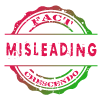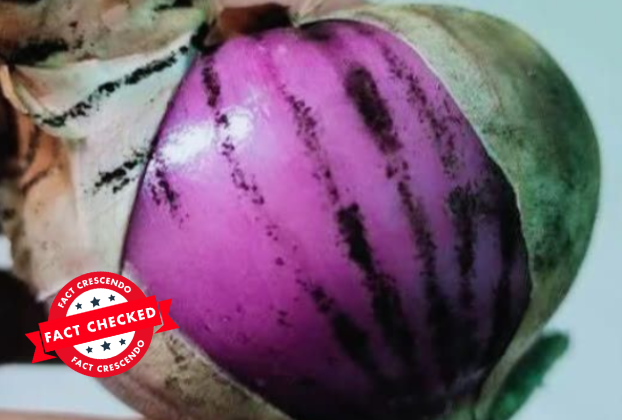දිනපතා සත්ය කරුණු දැන ගැනීමට අපගේ WhatsApp චැනලයටමෙතනින් එකතුවන්න.
There is a growing perception in society that the food we consume to sustain life can sometimes be life-threatening. In many cases, that is not because of any fault in the food itself, but because of various human activities, including the preparation of the food. Here is an investigation we did regarding such a social media post on onions.
Social Media Posts :
A social media post was posted, including a photo of an onion with black spots on the skin and the inner layer, referring to it as a deadly poisonous fungus. The following description was shared along with the description.
“Onions are used as an essential ingredient in preparing food for young children. This is because of the nutrients they contain. But there is a danger hidden in onions that we do not know about. Those of you who have children, be aware of this.
Onions contain many nutrients including, potassium, carbohydrates, sodium, vitamin C, vitamin B6, vitamin D, calcium, magnesium, and iron.
Namely, onion juice cures cancer, reduces glucose levels in the body, boosts immunity, fights allergies, eliminates respiratory problems, cures vision problems, is very good for nails, fights stress, provides good sleep, promotes fertility, and treats acne problems. Soothes, removes wrinkles, and also promotes hair growth.
The health benefits of onions, especially when eaten raw, help keep the digestive system healthy. It provides the body with the necessary immune system. If you eat one raw onion every day, the unwanted fat accumulated in the body will start melting gradually Research also shows that onions can reduce the risk of cancer.
But when you peel an onion, have you ever noticed that there is a black coating on it? Some people just cut it off. Some people wash it with water and then use it for cooking.
But some people still use it for cooking without knowing the dangers assocaited with it. Many people are unaware of the harmful effects of eating onions covered with this black coating.
Eating this type of onion can cause a fungal infection called Mucormycosis. This fungus is very toxic and should be washed thoroughly before using it for cooking. If you see black fungus in an onion, it is best not to use it. Never use an onion if it has black fungus and rot.
Eating onions with black fungus can cause headaches, nausea, stomach cramps, diarrhea, vomiting, and other similar symptoms.
Never use black coated onions in the food of asthmatics. It will harm them.
If there is this black fungus on the surface of the onion, only that part can be removed and used for cooking. But if the onion is black inside, never use it, because it will cause many allergic reactions.
P.S.
Not everyone’s body responds the same way. So don’t dismiss this as a trivial matter. “
This post describes the benefits of onions as a food item and how they can serve as a disease prevention. It also describes the black spots or the coating that can be seen on the skin or the outer layer of the onion and identifies it as a fungus named Mucormycosis. According to the post, it can cause many allergic reactions. Therefore, it is best to avoid consuming onions with the black coating.
Here is how it was further shared on Facebook. Archived Link
This was shared through WhatsApp as well.
Many people have believed that these claims are valid and have questioned them. In addition, people have shared many comments believing it to be true.
Here is how we investigated the facts about this post, which has caught the attention of many people.
Fact Check :
The social media post does not cite any credible sources for the information contained therein. Therefore, we conducted a fact-finding investigation to verify the veracity of the information contained in this social media post.
Nutrients in onions
According to the United States Department of Agriculture, the nutrients contained in a 110-gram medium-sized onion are as follows:
U.S. Department of Agriculture
Can the black coating on onions cause a fungal infection called mucormycosis?
Mucormycosis
Mucormycosis is a rare and potentially life-threatening fungal infection caused by fungi of the Mucorales family. Also known as Black Fungus, it spread rapidly among people who had recovered from COVID-19 in 2021. Details here.
However, there is no medical evidence that infection with the fungus found in onions causes mucormycosis.
The fungi that cause mucormycosis belong to a specific group called Mucorales, which includes fungi such as Rhizopus, Mucor, Lichtheimia, etc. A research paper from the Centers for Disease Control and Prevention (CDC) shows that these are not fungi that are typically found in spoiled food.
A review in StatPearls (via NCBI) shows that this heat-tolerant mucor fungus is commonly found in soil and decaying organic matter. It causes a severe, rapidly developing infection only in people with weakened immune systems.
The India Today Fact Check team also stated that Indian experts have confirmed that fungi found in refrigerators (such as Stachybotrys chartarum) and fungi on onions (such as Aspergillus niger) are entirely different from Mucomycetes delirii. Here’s the report on that.
A fact-finding report on the Times of India website states that the idea that fungi on refrigerators or onions cause infections of the mucous membranes is a myth.
Accordingly, to explain further,
The claim that fungi in refrigerators cause mucormycosis is false, and it is different from the mucormycosis fungi found in the domestic environment.
The claim that fungi on the surface of onions cause mucormycosis is false. – Fungi (such as Aspergillus) on the surface of onions are removed when properly washed and are usually harmless.
Mucormycosis originates from environmental fungi, and it can be caused by soil, dust, and devaying matter, especially in high-risk individuals.
Therefore, it is clear through reliable evidence that mucormycosis is not caused by fungi found in onions or refrigerators, but by specific environmental fungi (Mucorales).
How is mucormycosis is transmitted
It is mainly transmitted through breathing in fungal spores that are spread through the air.
It can enter through skin wounds, cuts, or burns.
It can also be transmitted through contaminated food and drink.
But it is not spread from person to person.
Response from Research Professor, Ms. Ilmi Hewajulige
We inquired with Research Professor Ilmi Hewajulige on whether eating onions with the black coating on onions, as shown on the social media post, is harmful to the body and how such a fungal condition occurs in onions.
The professor said that the fungus that can be seen in onions is Aspergillus niger. However, although it was previously stated that the fungus was not harmful to the body, it has recently been revealed that it is poisonous. However, she noted that it is not as dangerous as aflatoxin, adding that her institute has not conducted any research on this. The professor further stated that although research conducted in foreign countries has shown the presence of a toxin, no extensive research has been conducted on the extent of the harm it causes to the body.
The professor also noted that, it is best not to eat onions with these fungi Even vegetables and fruits that have a rotten side should be cut off, and the rest should not be eaten.
According to the United States Department of Agriculture, black coating on onions is caused by Aspergillus niger, a common fungus found in soil.
Confirming this, Dr. Shesh R. Nawange, a scientist at the Centre for Medical Mycology, Fungal Disease Diagnostic and Research Centre in Jabalpur, said, “This type of fungus causes infection in rare cases. However, onions should always be washed thoroughly before consumption.”
Dr. Ranjith Fernando, Deputy Director, Food Research Unit, Department of Agriculture
We also inquired about this from Dr. Ranjith Fernando, Deputy Director of the Food Research Unit of the Department of Agriculture. The Deputy Director stated that this type of fungus develops in onions because the onions are not harvested and stored correctly. That happens because farmers do not follow the correct methods in the post- harvest process, and harvest them before the right time to release them into the market to gain profit. Accordingly, the fungus grows in onions if the onions remain moist.
The professor noted that it is impossible to say directly whether such onions are poisonous or deadly, and that it depends on the fungus. However, he further states that it is not good to ingest the fungus. He explained that if the crops were prepared and released to the market in a manner that does not allow the fungus to grow, this situation would not arise, and that the farmers and other responsible sectors should take appropriate actions. Here is how to follow the proper procedure from cultivating onions to harvesting.
Medical professionals’ opinions on the fungus Aspergillus niger and its effects on health
The World Health Organization (WHO) and the Joint FAO/WHO Expert Committee on Food Additives state that “Aspergillus niger is a common contaminant in food. Available information suggests that it is not pathogenic to humans.”
The Institut national de santé publique du Québec notes that toxic effects caused by ingested Aspergillus niger toxins include cytotoxicity, neurotoxicity, and nephrotoxicity, but this is not considered a particularly poisonous fungus.
The Mayo Clinic explains that most strains of this fungus are harmless. However, people with weakened immune systems, lung disease, or conditions like asthma can become seriously ill when they inhale the spores of this fungus.
The CDC (Centres for Disease Control and Prevention) says that most people do not get sick from the Aspergillus fungus. However, it can cause severe illness in people with weakened immune systems or lung disease. Allergic reactions in sensitive individuals and exacerbation of asthma in people with existing respiratory conditions are common. More information here.
Scientific precautions and safety measures:
Wear gloves when handling onions with the Aspergillus fungus
Use a face mask when processing large quantities of the same onions
Work in well-ventilated areas to avoid inhaling Aspergillus spores
Wash your hands thoroughly after processing onions.
Join us to learn more about our investigative fact findings.
Facebook | Twitter | Instagram | Google News | TikTok | YouTube

Title:Do onions contain the deadly poisonous fungus Mucormycosis?
Fact Check By: Factcrescendo TeamResult: Misleading






